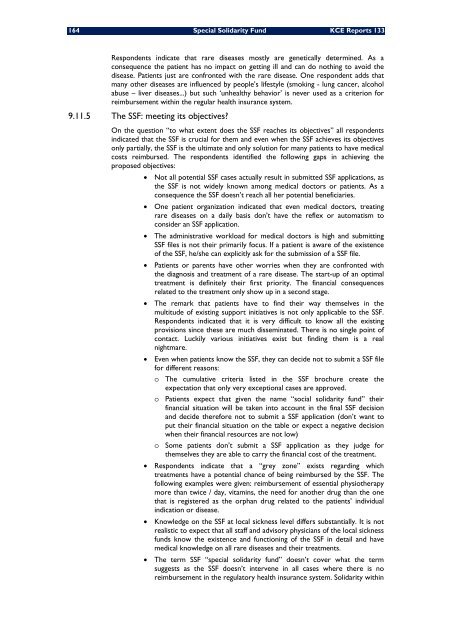Optimalisatie van de werkingsprocessen van het Bijzonder ... - KCE
Optimalisatie van de werkingsprocessen van het Bijzonder ... - KCE
Optimalisatie van de werkingsprocessen van het Bijzonder ... - KCE
You also want an ePaper? Increase the reach of your titles
YUMPU automatically turns print PDFs into web optimized ePapers that Google loves.
164 Special Solidarity Fund <strong>KCE</strong> Reports 133<br />
Respon<strong>de</strong>nts indicate that rare diseases mostly are genetically <strong>de</strong>termined. As a<br />
consequence the patient has no impact on getting ill and can do nothing to avoid the<br />
disease. Patients just are confronted with the rare disease. One respon<strong>de</strong>nt adds that<br />
many other diseases are influenced by people’s lifestyle (smoking - lung cancer, alcohol<br />
abuse – liver diseases...) but such ‘unhealthy behavior’ is never used as a criterion for<br />
reimbursement within the regular health insurance system.<br />
9.11.5 The SSF: meeting its objectives?<br />
On the question “to what extent does the SSF reaches its objectives” all respon<strong>de</strong>nts<br />
indicated that the SSF is crucial for them and even when the SSF achieves its objectives<br />
only partially, the SSF is the ultimate and only solution for many patients to have medical<br />
costs reimbursed. The respon<strong>de</strong>nts i<strong>de</strong>ntified the following gaps in achieving the<br />
proposed objectives:<br />
• Not all potential SSF cases actually result in submitted SSF applications, as<br />
the SSF is not wi<strong>de</strong>ly known among medical doctors or patients. As a<br />
consequence the SSF doesn’t reach all her potential beneficiaries.<br />
• One patient organization indicated that even medical doctors, treating<br />
rare diseases on a daily basis don’t have the reflex or automatism to<br />
consi<strong>de</strong>r an SSF application.<br />
• The administrative workload for medical doctors is high and submitting<br />
SSF files is not their primarily focus. If a patient is aware of the existence<br />
of the SSF, he/she can explicitly ask for the submission of a SSF file.<br />
• Patients or parents have other worries when they are confronted with<br />
the diagnosis and treatment of a rare disease. The start-up of an optimal<br />
treatment is <strong>de</strong>finitely their first priority. The financial consequences<br />
related to the treatment only show up in a second stage.<br />
• The remark that patients have to find their way themselves in the<br />
multitu<strong>de</strong> of existing support initiatives is not only applicable to the SSF.<br />
Respon<strong>de</strong>nts indicated that it is very difficult to know all the existing<br />
provisions since these are much disseminated. There is no single point of<br />
contact. Luckily various initiatives exist but finding them is a real<br />
nightmare.<br />
• Even when patients know the SSF, they can <strong>de</strong>ci<strong>de</strong> not to submit a SSF file<br />
for different reasons:<br />
o The cumulative criteria listed in the SSF brochure create the<br />
expectation that only very exceptional cases are approved.<br />
o Patients expect that given the name “social solidarity fund” their<br />
financial situation will be taken into account in the final SSF <strong>de</strong>cision<br />
and <strong>de</strong>ci<strong>de</strong> therefore not to submit a SSF application (don’t want to<br />
put their financial situation on the table or expect a negative <strong>de</strong>cision<br />
when their financial resources are not low)<br />
o Some patients don’t submit a SSF application as they judge for<br />
themselves they are able to carry the financial cost of the treatment.<br />
• Respon<strong>de</strong>nts indicate that a “grey zone” exists regarding which<br />
treatments have a potential chance of being reimbursed by the SSF. The<br />
following examples were given: reimbursement of essential physiotherapy<br />
more than twice / day, vitamins, the need for another drug than the one<br />
that is registered as the orphan drug related to the patients’ individual<br />
indication or disease.<br />
• Knowledge on the SSF at local sickness level differs substantially. It is not<br />
realistic to expect that all staff and advisory physicians of the local sickness<br />
funds know the existence and functioning of the SSF in <strong>de</strong>tail and have<br />
medical knowledge on all rare diseases and their treatments.<br />
• The term SSF “special solidarity fund” doesn’t cover what the term<br />
suggests as the SSF doesn’t intervene in all cases where there is no<br />
reimbursement in the regulatory health insurance system. Solidarity within

















